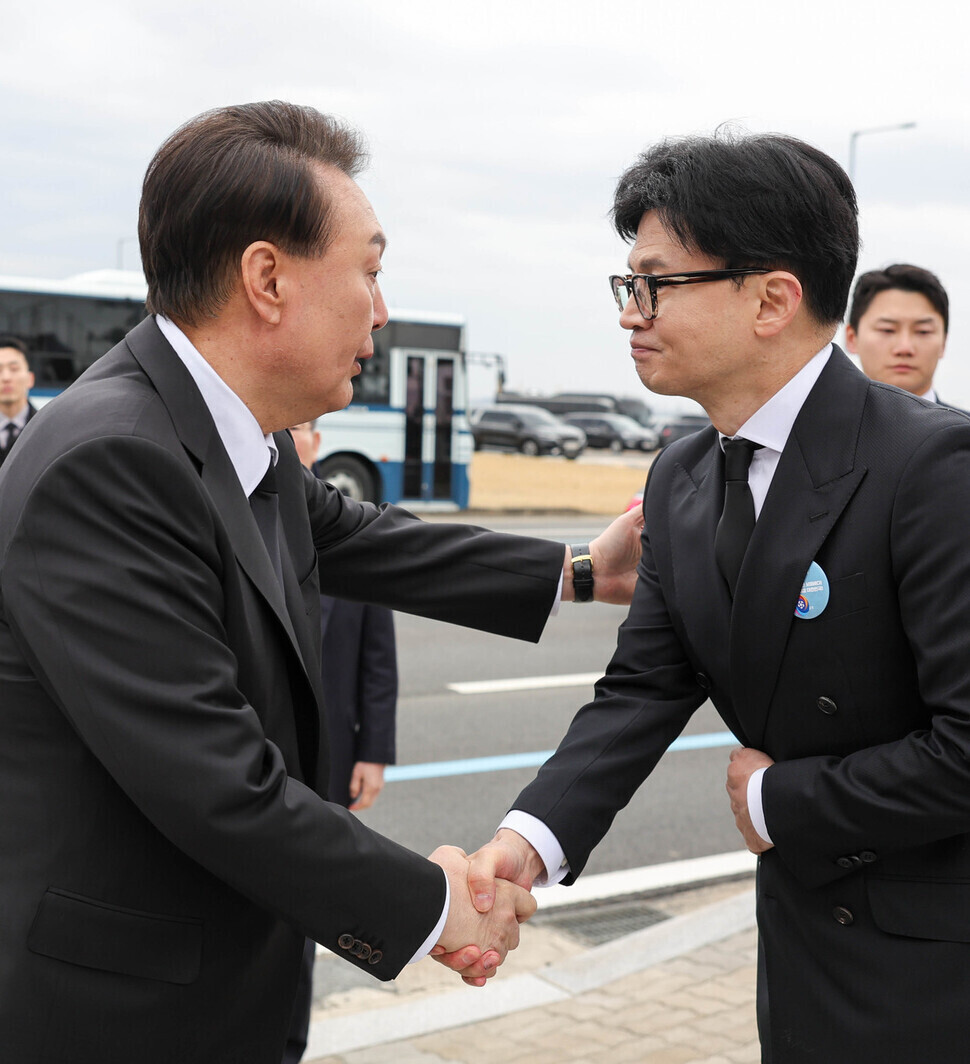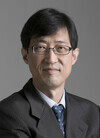hankyoreh
Links to other country sites 다른 나라 사이트 링크
[Column] A death blow to Korea’s prosecutor politics


By Park Yong-hyoun, editorial writer
“Unlock Han Dong-hoon’s cell phone and replace the Yoon Suk-yeol lineup in the prosecution leadership.”
These were the suggestions made in an interview with the Hankyoreh by Konkuk University law professor and People’s Solidarity for Participatory Democracy (PSPD) co-representative Han Sang-hee shortly after Yoon Suk-yeol was elected as South Korean president two years ago after previously serving as the country’s prosecutor general.
Regarding Han Dong-hoon’s appointment as Minister of Justice, the professor advised, “Candidates have the responsibility to dispel all allegations. One way or another, he’s going to need to provide [the cell phone content in question] clearly to the public.”
He also warned, “The public’s trust in the independence and objectivity of the prosecutors collapses the moment things take on the appearance of the prosecution leadership consisting of associates of the president.”
“It’s a matter that forms the backbone of the liberal democracy that President-elect Yoon Suk-yeol has been emphasizing most strongly, so they should take the initiative in resolving that,” he urged.
These seemed like entirely sensible demands, and I expected to see at least some gesture toward meeting them. But the administration and prosecutors alike ignored them completely. Most news outlets likewise remained silent.
The South Korean public has witnessed in the two years since then what kind of “prosecution republic” the administration and prosecutors get to enjoy with their monopoly on power. The high-handed practices carried over into the general election — and the people passed judgment accordingly.
It is in the twisted legacy of the prosecutors that we find the roots of Yoon’s model of statecraft, which has so upset the public over the last two years, and of Han’s approach to election campaigning, which became a subject of widespread mockery.
Among the democratic states, we see no other examples like the South Korean one, where prosecutors have established themselves as a lone independent power institution. They possess immense authority with their investigation and indictment powers, and they boast a well-oiled and cohesive organization.
Their discretionary powers have been broadened so massively — under the “principle of discretionary prosecution” — that they are capable of blithely looking the other way in cases of serious crimes while doggedly harassing other people, even when there are no crimes to be found. All of this is rooted in their organizational interests.
A bigger problem is the fact that the public has more or less no means of controlling them when they abuse their powers in ways that go beyond the bounds of fairness and neutrality. The figures that the public elects to power have finite terms; meanwhile, the powers of the prosecutorial organization go on and on.
As a candidate, Yoon commented on the prosecution reform efforts of then-President Moon Jae-in’s administration by saying, “What’s so great about a five-year presidential term? They’re being too fearless.” His remarks betrayed what appeared to be a sense of pride in the permanence of the prosecutors’ powers: an arrogant “no one can touch us” attitude.
The untrammeled and seemingly eternal powers that prosecutors enjoy translate into a “chosen ones” mentality and a sense of superiority toward the public and their opinions. Yoon and Han seem to have been so susceptible to this that they overlooked a key fact: once they became politicians, their powers depend on the public’s choices.
Examples of this kind of discretionary approach to governing — in defiance of the public will, common sense, and principles — have been too numerous to count.
Allegations of the first lady’s involvement in stock price manipulations were not investigated even after the alleged accomplices were convicted. A bill for a special prosecutor to investigate was stymied when the president exercised his de facto veto privilege.
Amid an ongoing investigation into the tragic and preventable death of a Marine, the administration appointed one of the suspects as ambassador and whisked him overseas, even after an exit ban had been imposed on him.
These sorts of bizarre moves — which continued all the way up to the election — are difficult to account for through anything else but the prosecutors’ characteristic arrogance.
A convicted criminal received a special presidential pardon and was nominated as a candidate for the ruling People Power Party. Han described the person in question as a “righteous man.” Meanwhile, he portrayed the opposing party as a gang of lawbreakers, asking “why should I prostrate myself [to the public] when I’m fighting criminals?”
Referring to one PPP National Assembly candidate, he said, “Here’s someone who is doing quite well for herself without this. She’s doing this for you.” His remarks treated the public as some kind of gallery offering up applause or as a group of beggars, rather than the ones truly in charge in democratic politics. They exemplify the way that prosecutors tend to view the public.
The results of the general elections amounted to an impeachment of this style of prosecution politics.
There’s no law that says prosecutors can’t pursue political careers — but the South Korean public has more than had its fill of Yoon and Han’s brand of politics. Two of the top former prosecutors who embody this twisted legacy are the ones responsible for inviting the public’s judgment and demands for an end to this “prosecution politics.”
Judgment was also passed on the prosecutors who have acted as their loyal subordinates. Devoting themselves single-mindedly to investigating figures from opposition parties and the previous administration, they only played into the opposition’s frame of a “dictatorship of prosecutors.”
The groundswell of support for the Rebuilding Korea Party was powered by the practice of forgoing investigations of the people who actually wield power — in stark contrast with the kind of fishing expedition investigation tactics the prosecutors applied to Cho Kuk in the past. As both the base of prosecution politics and the means of practicing it, prosecutors have only fueled demands for fundamental reforms, including the complete separation of investigation and indictment powers and stronger democratic controls.
After two years, the “prosecutors’ administration” has effectively come to an end. If Yoon insists on carrying on with this political approach, he will only meet fierce resistance from the public; if the prosecutors fail to reflect and reform, they could end up fading into history.
That’s the fearsome warning that the public sent with this election.
Please direct questions or comments to [english@hani.co.kr]

Editorial・opinion
![[Column] Season 2 of special prosecutor probe may be coming to Korea soon [Column] Season 2 of special prosecutor probe may be coming to Korea soon](https://flexible.img.hani.co.kr/flexible/normal/500/300/imgdb/original/2024/0426/3317141030699447.jpg) [Column] Season 2 of special prosecutor probe may be coming to Korea soon
[Column] Season 2 of special prosecutor probe may be coming to Korea soon![[Column] Park Geun-hye déjà vu in Yoon Suk-yeol [Column] Park Geun-hye déjà vu in Yoon Suk-yeol](https://flexible.img.hani.co.kr/flexible/normal/500/300/imgdb/original/2024/0424/651713945113788.jpg) [Column] Park Geun-hye déjà vu in Yoon Suk-yeol
[Column] Park Geun-hye déjà vu in Yoon Suk-yeol- [Editorial] New weight of N. Korea’s nuclear threats makes dialogue all the more urgent
- [Guest essay] The real reason Korea’s new right wants to dub Rhee a founding father
- [Column] ‘Choson’: Is it time we start referring to N. Korea in its own terms?
- [Editorial] Japan’s rewriting of history with Korea has gone too far
- [Column] The president’s questionable capacity for dialogue
- [Column] Are chaebol firms just pizza pies for families to divvy up as they please?
- [Column] Has Korea, too, crossed the Rubicon on China?
- [Correspondent’s column] In Japan’s alliance with US, echoes of its past alliances with UK
Most viewed articles
- 1‘We must say no’: Seoul defense chief on Korean, USFK involvement in hypothetical Taiwan crisis
- 2Why Kim Jong-un is scrapping the term ‘Day of the Sun’ and toning down fanfare for predecessors
- 3Two factors that’ll decide if Korea’s economy keeps on its upward trend
- 4After election rout, Yoon’s left with 3 choices for dealing with the opposition
- 5BTS says it wants to continue to “speak out against anti-Asian hate”
- 6AI is catching up with humans at a ‘shocking’ rate
- 7Noting shared ‘values,’ Korea hints at passport-free travel with Japan
- 8Gangnam murderer says he killed “because women have always ignored me”
- 9South Korea officially an aged society just 17 years after becoming aging society
- 10Ethnic Koreans in Japan's Utoro village wait for Seoul's help